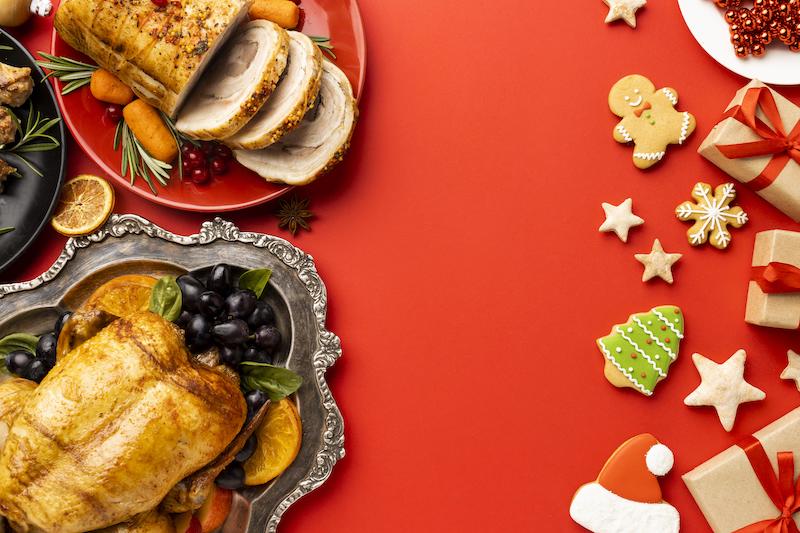
6 Tips for Holiday Binge Eating
The holidays can be a wonderful season filled with connection, gratitude, and celebration. On the other hand, the potential for holiday binge eating can also bring up a lot of stress around food.
If you’re healing your relationship with food, the endless gatherings, comments about weight, and “once-a-year” foods can feel overwhelming. You might notice old patterns creeping in, like restricting before events, overeating at them, and then feeling guilty afterward.
What if this year could be different?
What if your focus wasn’t on controlling food, but caring for yourself through food?
Here are some gentle, practical holiday eating tips that can help you avoid binge eating, manage emotional eating, and stay connected to your body without falling into diet culture traps.
1. Don’t Skip Meals. Eat Every 3–4 Hours
One of the biggest triggers for holiday binge eating is under-eating during the day. Many people “save up” for big meals or skip breakfast to “make room” for later, but this almost always backfires.
When you go too long without food, your hunger cues intensify, your blood sugar drops, and your body goes into survival mode. That’s when you’re more likely to eat past fullness or feel out of control around food.
✨ Try this: Eat regularly, about every 3–4 hours. Include balanced meals with carbs, protein, and fat. Keeping your body nourished supports calm, intentional eating when you’re surrounded by holiday foods.
2. Use the Hunger–Fullness Scale as a Guide
You don’t need to track calories or count macros to eat mindfully. Instead, tune into your body’s hunger and fullness cues using a simple 1–10 scale:
- 1 = extremely hungry (shaky, lightheaded)
- 5 = comfortable, neutral
- 10 = overly full, uncomfortable
✨ Try this:
Before you eat, pause and ask: Where am I on the hunger scale?
Mid-meal, check in again. If you’re approaching fullness but still enjoying the food, slow down or pause to see how your body feels.
There’s no perfect number. This is simply information to help you eat in a way that feels good physically and emotionally. Grab the full hunger and fullness scale inside Revolution Health’s Food & Feelings Journal.
3. Set Boundaries Around Body and Food Talk
Holiday gatherings often bring unsolicited comments like “Are you really going to eat that?” or “You look great, did you lose weight?”
These remarks can be triggering, especially if you’re working on healing your relationship with food or body image.
✨ Try these respectful yet firm, boundary-setting tools:
- Redirect: “Let’s talk about something more fun. How’s your trip been?”
- Assert: “I’m focusing on having a peaceful relationship with food, so I’d rather not discuss diets.”
- Exit: If needed, excuse yourself from the conversation.
Boundaries aren’t rude; they’re a form of self-respect. Protecting your mental and emotional space is part of intuitive eating too.
4. Reframe Scarcity Thinking: “This Food Is Always Available”
A common thought during the holidays is, “I can only have this food once a year.” That scarcity mindset often triggers overeating and guilt.
✨ Try this reframe:
“This food will be available again.”
You can make stuffing in March or cookies in July. Remind yourself that food isn’t disappearing after the holidays. When you know you can have it again anytime, the urgency fades and satisfaction increases.
You can also start practicing with your trigger foods RIGHT NOW. For example, if you are worried about overeating mashed potatoes at Thanksgiving, practice eating mashed potatoes to a comfortable level of fullness on a random weeknight. Worried about the Christmas cookies, make a batch this weekend and practice having them in a way that feels balanced. Practice builds trust!
5. Take Home Leftovers
You don’t have to finish everything on your plate just because it’s there. If you’re full but still love the food, save it for later.
✨ Try this:
Bring a container or ask your host for one. Having leftovers reinforces that you can enjoy those foods again when you’re hungry. It turns “I need to eat this all now” into “I get to enjoy this again later.”
This small shift helps calm the scarcity mindset that fuels holiday binge eating.
6. Check In With Your Emotional Needs
Sometimes, what feels like “food cravings” is really a sign that you need comfort, rest, or connection.
✨ Try this:
Before eating, ask:
- Am I physically hungry or emotionally uncomfortable?
- What might I be needing right now (rest, support, alone time, connection)?
This doesn’t mean you can’t eat when you’re emotional. It simply helps you eat with awareness, compassion, and choice. If you need a moment to check in with yourself, take 5 minutes to use the restroom, get something from your car, or find an empty room to take a breath.
Final Thoughts on Holiday Binge Eating
This holiday season, release the pressure to “eat perfectly.” There’s no such thing!
Instead, focus on gentle nourishment, self-trust, and curiosity.
Eat regularly, listen to your body, set boundaries, and remind yourself that food is abundant, not something you need to earn or control.
When you approach the holidays from a place of care instead of restriction, you’ll discover something better than “willpower.” You’ll find peace, presence, and true satisfaction around food.
You deserve that, this season and every season. For additional support with binge eating or disordered eating please seek the support of a licensed therapist or registered dietician.


